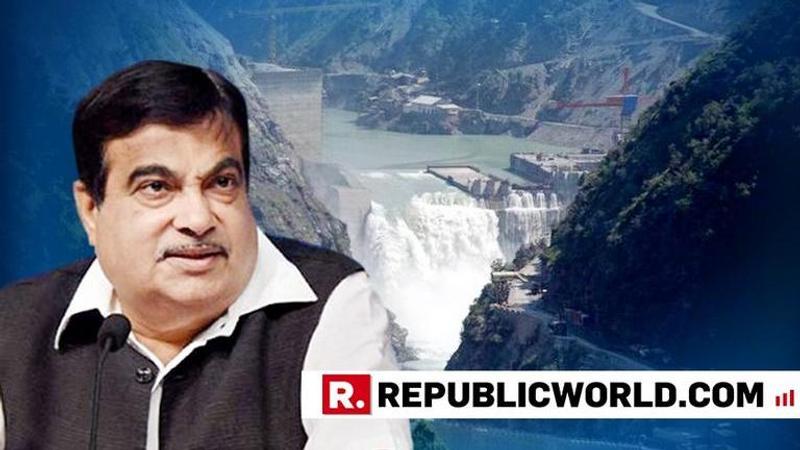Published 15:28 IST, January 11th 2019
Government giving attention to arrest India's unutilised water under IWT from entering Pakistan: Nitin Gadkari
The government has given special attention to stop unutilised water allotted to India under the 'Indus Waters Treaty' from entering Pakistan, Union minister Nitin Gadkari said on Friday.

The government has given special attention to stop unutilised water allotted to India under the 'Indus Waters Treaty' from entering Pakistan, Union minister Nitin Gadkari said on Friday.
Gadkari, the minister for water resources, river development and Ganga rejuvenation, also signed an MoU with six chief ministers for the construction of Renukaji Multi-Purpose Dam project in the Upper Yamuna Basin.
The pact was signed with chief minister Yogi Aditynath of Uttar Pradesh, Ashok Gehlot of Rajasthan, Trivendra Singh Rawat of Uttarakhand, Manohar Lal of Haryana, Arvind Kejriwal of Delhi and Jairam Thakur of Himachal Pradesh.
Another agreement was signed for Namami Gange projects in Allahabad under Hybrid Annuity Mode and One-City-One-Operator concept by the National Mission for Clean Ganga, UP Jal Nigam and Dilip Pormal from Prayagraj Water Pvt. Ltd.
Addressing the gathering, Gadkari said there is enough water available in the country, but the real issue is its effective management.
"We have done one thing. The rivers awarded to India under the Indus Waters Treaty....(some portion of) our share still goes to Pakistan. The first thing we did was to arrest the (excess) water and we will take it to Punjab, Haryana, Uttar Pradesh, and Rajasthan and Delhi will benefit from it," he said.
Under the Indus Waters Treaty, waters flowing in three of Indus tributaries -- the Sutlej, Beas and Ravi -- have been allotted to India; while the Chenab, Jhelum and Indus waters have been allotted to Pakistan.
Of the total 168 million acre-feet, India's share of water from the three allotted rivers is 33 million acre-feet, which constitutes nearly 20 per cent. India uses nearly 93-94 per cent of its share under the Indus Waters Treaty. The rest of the water remains unutilised and goes to Pakistan.
After the Uri attack in 2016, it was decided to fast track water projects to arrest the unutilised water.
The three projects to arrest this water from going to Pakistan, include the Shahpur Kandi dam project, a second Sutlej-Beas link in Punjab and the Ujh Dam project in Jammu and Kashmir.
An agreement has been signed on one project and there is a progress in other two projects, Gadkari said.
Terming the signing of agreement for Renukaji Dam project a historic moment, Gadkari said that the government will try to get the Cabinet approval as soon as possible.
He added that a consensus on Kishau Multi Purpose project on Yamuna river has also been developed and soon an agreement for it will also be signed. He also informed about the Lakhwar Multi Purpose project for which agreement was signed on August 28 among six basin states.
Gadkari said that these projects will benefit all basin states and it is a "win-win situation" for everyone.
"Delhi will not face drinking water issues for the next 50 years. Rajasthan, which is at the tail end, will also get water for drinking and irrigation."
He added that these projects will also ensure more flow in River Yamuna which is the need-of-the-hour.
Renukaji Dam project has been conceived as a storage project on Giri River (tributary of river Yamuna) in Sirmour District of Himachal Pradesh. The project envisages construction of 148 M high rock filled dam for supply of 23 cumecs water to Delhi and other basin states.
The project will also generate 40 MW of power during peak flow and will be executed by Himachal Pradesh Power Corporation Ltd. (HPPCL).
The live storage of Renukaji MPP is 0.404 million acre feet (MAF) and total submergence area is about 1508 hectares in the territory of Himachal Pradesh.
Stored water of Renukaji Dam will be used by Uttar Pradesh, Haryana and Delhi from the Hathnikund Barrage, by Delhi from Wazirabad Barrage and by UP, Haryana and Rajasthan from the Okhla Barrage.
The share of these states is as follows: Haryana, Uttar Pradesh/Uttarkhand and Himchal Pradesh, Rajasthan and Delhi will get 47.82 per cent, 33.65 per cent, 3.15 per cent, 9.34 per cent and 6.04 per cent respectively.
Delhi has agreed to fund 90 per cent of the cost of power component of the project.
Updated 15:28 IST, January 11th 2019




